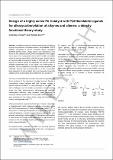Design of a highly active Pd catalyst with P,N hemilabile ligands for alkoxycarbonylation of alkynes and allenes : a density functional theory study
Abstract
In palladium-catalysed methoxycarbonylation of technical propyne, the presence of propadiene poisons the hemilabile Pd(P,N) catalyst. According to density functional theory calculations (B3PW91-D3/PCM level), a highly stable π-allyl intermediate is the reason for this catalyst poisoning. Predicted regioselectivities suggest that at least 11% of propadiene should yield this allyl intermediate, where the reaction gets stalled under the turnover conditions due to an insurmountable methanolysis barrier of 25.8 kcal mol-1. Results obtained for different ligands and substrates are consistent with the available experimental data. A new ligand, (6-Cl-3-Me-Py)PPh2, is proposed, which is predicted to efficiently control the branched/linear selectivity, avoiding rapid poisoning (with only 0.2% of propadiene being trapped as Pd allyl complex), and to tremendously increase the catalytic activity by decreasing the overall barrier to 9.1 kcal mol-1.
Citation
Ahmad , S & Buehl , M 2019 , ' Design of a highly active Pd catalyst with P,N hemilabile ligands for alkoxycarbonylation of alkynes and allenes : a density functional theory study ' , Chemistry - A European Journal , vol. 25 , no. 50 , pp. 11625-11629 . https://doi.org/10.1002/chem.201902402
Publication
Chemistry - A European Journal
Status
Peer reviewed
ISSN
0947-6539Type
Journal article
Description
Authors thanks EaStCHEM and the School of Chemistry for support.Collections
Items in the St Andrews Research Repository are protected by copyright, with all rights reserved, unless otherwise indicated.

